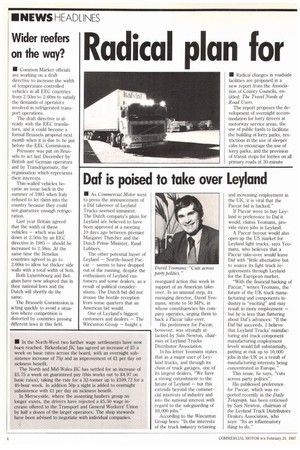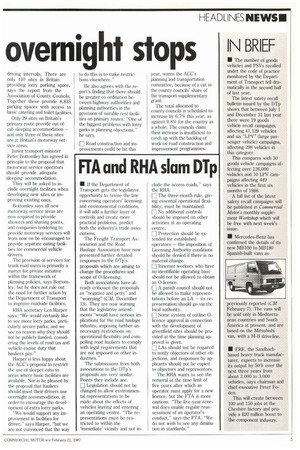Radial plan for overni ht sto s
Page 6

Page 7

If you've noticed an error in this article please click here to report it so we can fix it.
• Radical changes in roadside facilities are proposed in a new report from the Association of County Councils, entitled: The Travel Needs of Road Users.
The report proposes the development of overnight accommodation for lorry drivers at motorway service areas, the use of public funds to facilitate the building of lorry parks, restrictions in the use of sleeper cabs to encourage the use of lorry parks, and the provision of transit stops for lorries on all primary roads at 30-minute driving intervals. There are only 410 sites in Britain providing lorry parking space, says the report from the Association of County Councils. Together these provide 8,835 parking spaces with access to basic catering and toilet facilities.
Only 29 sites on Britain's primary route provide out-ofcab sleeping accommodation — and only three of these sites are at Britain's motorway service areas.
Junior transport minister Peter Bottomley has agreed in principle to the proposal that motorway service operators should provide adequate sleeping accommodation.
They will be asked to include overnight facilities when developing new sites or improving existing ones.
Bottomley says all new motorway service areas are now required to provide showers and shaving points, and companies tendering to provide motorway services will from now on be encouraged to provide separate eating facilities for commercial vehicle drivers.
The provision of services for trunk road users is primarily a matter for private initiative within the framework of planning policies, says Bottomley, but he does not rule out the need for further action by the Department of Transport to improve roadside facilities.
RHA secretary Len Harper says: "We would certainly like to see more lorry parks, particularly secure parks, and we see no reason why they should not be publicly funded, considering the levels of road tax and vehicle excise duty that hauliers pay."
Harper is less happy about the ACC's proposal to restrict the use of sleeper cabs to areas where basic facilities are available. Nor is he pleased by the proposal that hauliers should insist their drivers use overnight accommodation, in order to encourage the development of extra lorry parks.
"We would support any improvement in facilities for driver," says Harper, "but we are not convinced that the way to do this is to make restrictions elsewhere."
He also agrees with the report's finding that there should be greater co-ordination between highway authorities and planning authorities in the provision of suitable rest facilities on primary routes: "One of the biggest problems with lorry parks is planning objections," he says.
Road construction and improvements could be hit this year, warns the ACC's planning and transportation committee, because of a cut in the county councils' share of the transport supplementary grant.
The total allocated to county councils is scheduled to increase by 6.7% this year, as against 9.8% for the country as a whole. The councils claim their increase is insufficient to catch up with the backlog of work on road construction and improvement programmes.












































































